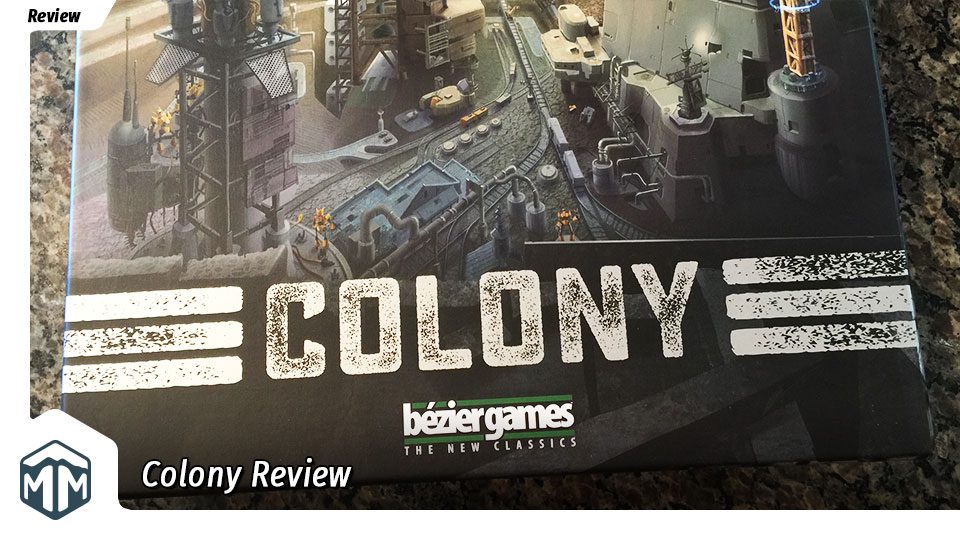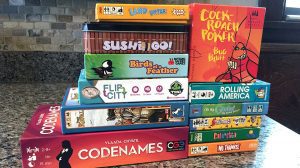Colony Overview
In Colony 1-4 players are attempting to rebuild their colonies which have been devastated by the “nanopocalypse”. Construct new buildings, upgrade existing buildings, steal valuable resources from your opponents, and store goods critical to your survival, all at the roll of a die…lots and lots of dice.
How to Set Up Colony
Each player selects a color and takes their four starting cards, with the white side face up. Place all white (stable) and grey (unstable) dice, the circular CHIPI tokens, and the scoreboard in reach of all players. Lay out the six Basic cards:
- GMO Farm
- Protein Lab
- Fabric Replicator
- Fiber Mill
- Uranium Mine
- Fallout Shelter
Each game you will choose seven unique cards and add them the the pool of purchasable cards. You can choose one of the four suggested configurations or use the free Colony setup app from Bezier Games to construct a completely unique game. For your first game the designers recommend you start with the following cards:
- Pirate
- Scrap Shack
- Hospitality Suite
- Pawn Shop
- Chain Link Fence
- Prize Safe
- Time-Lock Vault
Players each take 3 stable dice, roll them, and place them in their warehouse. Then once you select a starting player, you’ll be ready to begin.
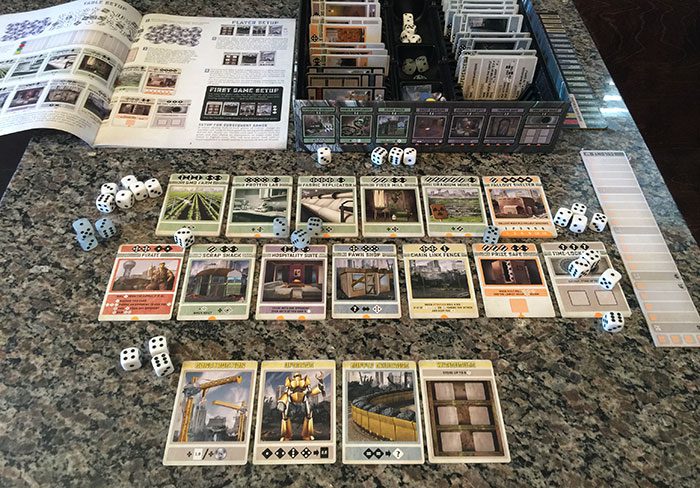
Colony Cards
Before you start your game, you’ll want to take a look at the center of the table and see what you have to work with. The cards in Colony are broken into 7 groups (Production, Exchange, Trade, Attack, Other, Paragon, and Defensive.), but in general the cards do one of three things for you:
- Give you a resource (through Production or Attack cards)
- Exchange resources (Pawn Shop, Supply Exchange)
- Generate points (Fallout Shelter, Prize Safe)
Understanding which cards are available to you is at the heart of creating a winning strategy.
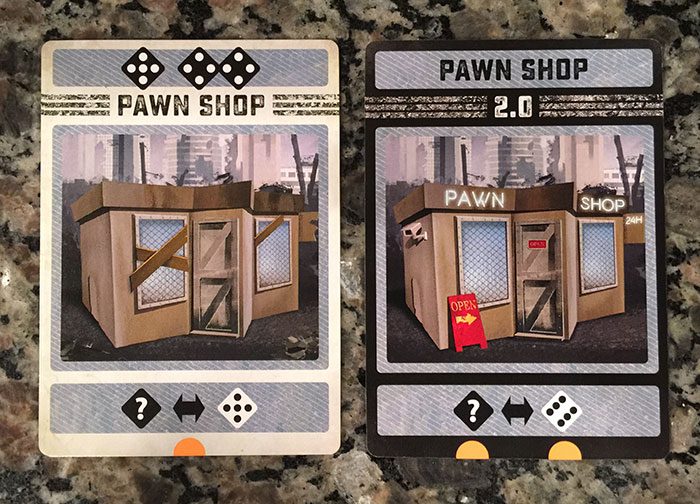
How to Play Colony
On a player’s turn they’ll select 3 stable dice and roll them. Starting with the active player, each person selects 1 die to place in their warehouse. In a two player game the active player gets the extra die, while in a four player game the 4th player receives a CHIPI token (good for 1 free unstable die).
The active player then two primary actions and a number of secondary actions which can be performed. They can choose to construct a new building by using their Construction action card. This allows them to build a card from the center of the playing area by paying the cost indicated at the top of the card.
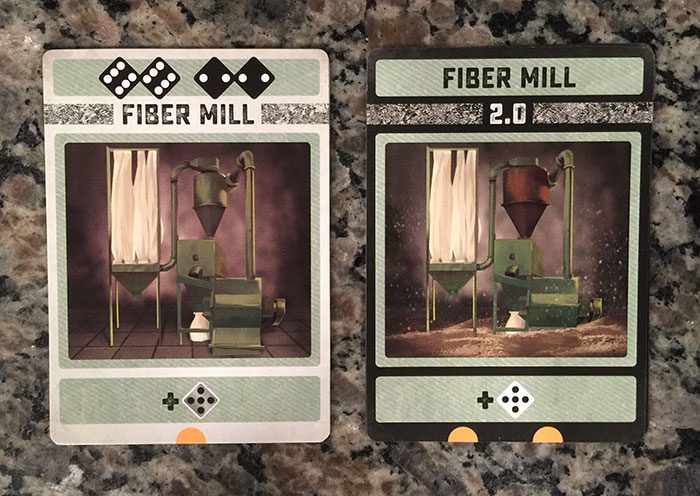
Players immediately receive the number of points indicated at the bottom of the card. Most cards will have between 1 and 3 orange semicircle point indicators while others, like the Prize Safe, use the roll of a die to dictate the value of that card.

Players can also choose to upgrade a previously constructed building. They do this by paying the cost located on their Upgrade card. Every card in the game has a 1.0 and a 2.0 side. When performing the Upgrade action a player flips the selected card from the 1.0 to the 2.0 side and immediately receives the difference in points from the previous side.
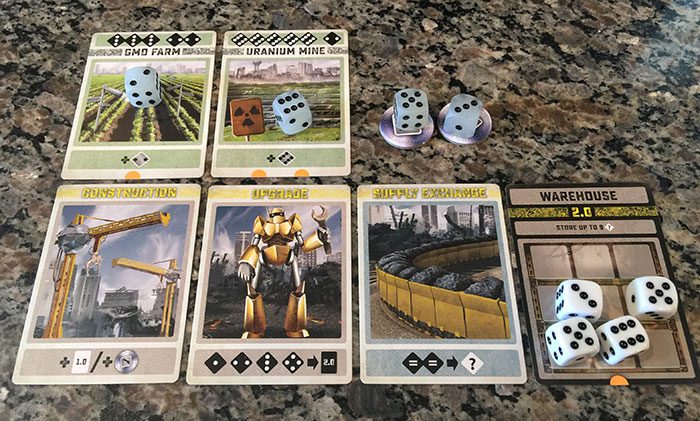
After a player has finished all of their actions, they store any remaining stable dice in their warehouse and return any unstable dice to the pool.
The game continues until one player reaches the point limit, which immediately ends the game.
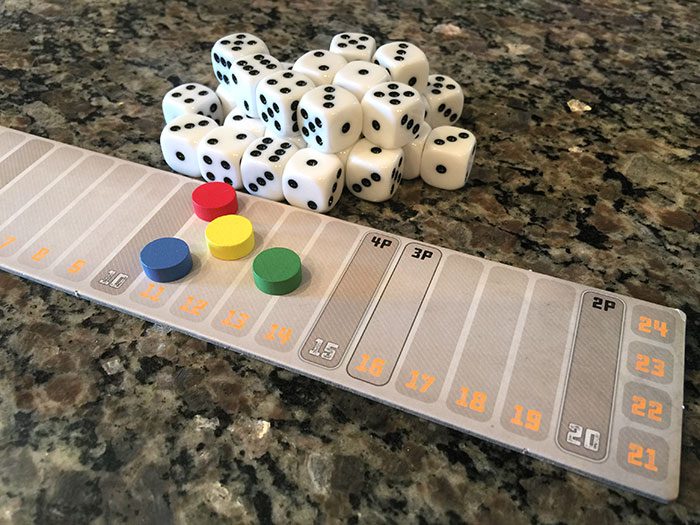
What I Like About Colony
The artwork in Colony is excellent: richly detailed, futuristic, gritty, with faded hues reminding you of the faded future.
The insert for Colony is very well designed. There are slots for all of the cards with enough room for expansions and promo cards. There are also two compartments for the dice, cleverly tucked underneath the center console. The insert even leaves enough room for sleeved cards should that be something you’re interested in doing.
Both the white and frosted dice are high quality, with a great finish. If you’re familiar with the dice from Favor of the Pharaoh (another Bezier game), then you’ll be familiar with the dice from Colony.
While I’m on the subject of dice, it’s worth calling attention to the high degree of luck found in any dice rolling game. The designers of Colony have done a great job accounting for that luck by including a number of ways to mitigate bad dice rolls. Exchanging / converting dice (Pawn Shop, Supply Exchange), utilizing cards which provide a free die on every turn (all Basic cards), and using Attack cards which allow you to steal resources from your opponents are just a few of the ways they mitigate randomness.
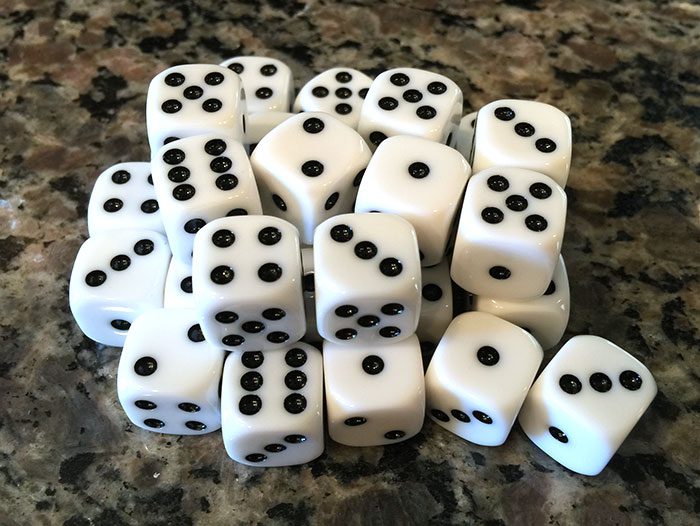
At the heart of Colony, though, are the cards. Excluding the six basic cards found in every game, there are 28 different cards to assist you in rebuilding your Colony. Given that you’ll only use 7 of these variable cards in each game, you’ll have 1,184,040 possible combinations of cards.
The variety of cards will excite experienced players and get them thinking about the best way to maximize their turns. The luck inherent in the dice rolls still allow beginner players to compete.
As mentioned previously, Bezier offers four suggested combinations of cards to get you started. After you’ve mastered those starter builds, you can start combining cards on your own and see how well you do.
What I Dislike About Colony
I do have a few minor gripes about Colony, but none of them are deal breakers.
The scoring tokens are traditional red, blue, green, and yellow. With the amazing colors and art found in the rest of the game, those primary colors feel a bit out of place. It would have been great if Bezier took it to the next level and offered them in black or silver metallic tokens; or even fluorescent orange or green.
Colony includes a nicely printed cardboard insert which helps you organize the cards. It’s printed on both sides, but oddly enough, the two sides are reversed. This means that if you’re not paying attention you could put it back with the opposite side facing up and really confuse yourself the next time you start pulling cards out. I’d really be curious to hear if that was on purpose.
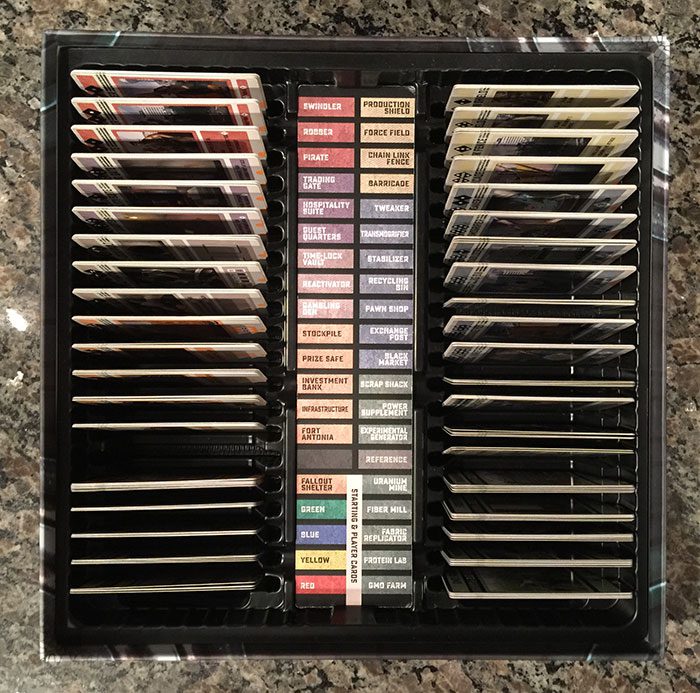
I’ve already talked about the benefits of variety in the cards, but the flip side of that is the potential for indecision. There’s so many ways to mitigate the luck of the dice roll in this game that it can take some players several minutes to determine their course of action. Furthermore, the attack cards can make it difficult to plan ahead since you never know if someone coming before you will steal resources from your warehouse.
In the games I’ve played, the first few turns were generally focused on resource gathering. Since you start with only four pre-rolled dice, there’s no guarantee that you’ll have the resources you need to construct new buildings. This might lead to several turns where players must take a CHIPI and pass to the next player.
Final Thoughts on Colony
After my first game of Colony, I really didn’t want to play again. We didn’t “get” the strategy and we were left frustrated, not seeing the possibilities. When I came back for my second game I had been thinking about different strategies and felt more prepared.
Colony is a game which rewards creative thinking. Taking a handful of junk dice and crafting a meaningful turn is rewarding and beneficial. Each player can take completely different strategies but still have a chance to win the game. In the last game I played I went in early for Prize Safes and jumped to an early lead, but lost out to the player who took another approach.
Colony is a solid game from Bezier and well worth your shelf space. Give it a try today!
What do you think about Colony? Give us your opinions about what you like and/or dislike about the game in the comments below!


